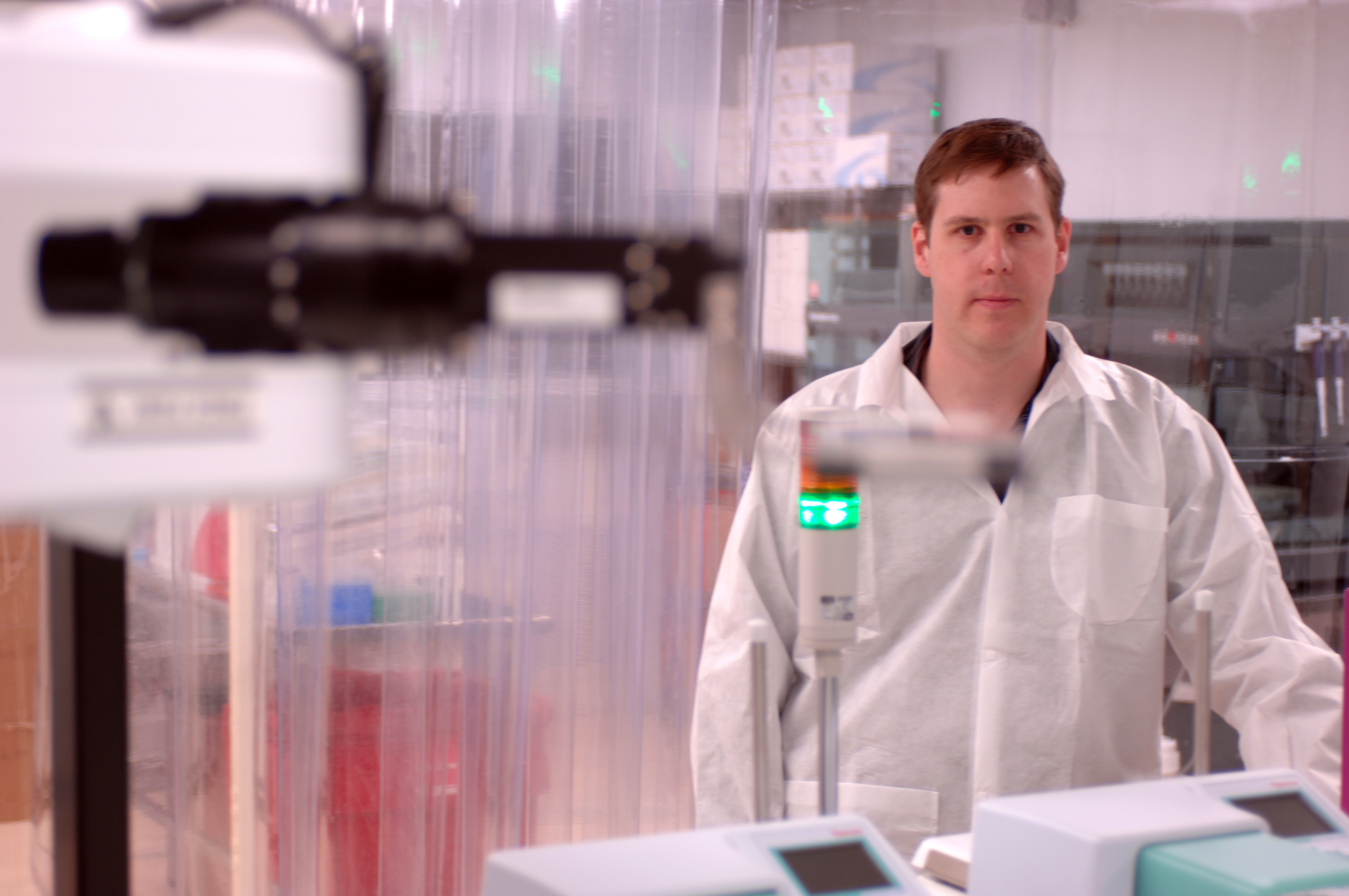June 7, 2019 | Jola Glotzer
Noncoding RNA and cancer
CBC Senior Investigator, Kevin White, UChicago and Tempus, demonstrates that post-transcriptional editing of noncoding RNA, seen in many types of cancers, may actually play a role in carcinogenesis itself

CBC Senior Investigator Kevin White, UChicago. (Source: UChicago Chronicle)
Congratulations to Kevin White, UChicago, senior author on a recent publication in JCO Clinical Cancer Informatics, titled “Clinical Relevance of Noncoding Adenosine-to-Inosine RNA Editing in Multiple Human Cancers.” The publication investigates the prevalence of post-transcriptional editing of noncoding RNA (ncRNA) in four human cancer types. In kidney cancer, the authors identify editing sites in 3’ untranslated region (3’UTR) of ncRNA that can affect gene expression in human embryonic kidney cells. The authors hypothesize that the 3’UTR editing sites may affect cell proliferation, however more work is needed to fully understand the mechanism of ncRNA involvement in carcinogenesis.
White, who is also president of a biotech start-up Tempus Labs, was recruited to UChicago in 2006 with help of a generous CBC Resources Fund Award, and hence was named the first CBC Senior Investigator.
Publication linked to CBC funding*:
Gu T, Fu AQ, Bolt MJ, White KP. Clinical Relevance of Noncoding Adenosine-to-Inosine RNA Editing in Multiple Human Cancers. JCO Clin Cancer Inform. 2019 Jun;3:1-8. (PubMed)
ABSTRACT
PURPOSE:
RNA editing is a post-transcriptional process that alters the nucleotide sequences of certain transcripts, in vertebrate most often converting adenosines to inosines. Multiple studies have recently implicated RNA editing in cancer development; however, most studies have focused on recoding RNA editing events. The function and clinical relevance of noncoding RNA (ncRNA) editing events in cancers have not been systematically examined.
PATIENTS AND METHODS:
We improved our previously published pipeline to identify ncRNA editing sites from four human cancers: liver hepatocellular carcinoma, lung adenocarcinoma, kidney renal clear-cell carcinoma, and thyroid carcinoma. We then developed multiple advanced statistical models to identify significantly differential edited (DE) sites between tumor and normal samples and clinical relevance ncRNA editing sites, as well as to investigate the association between gene expression, ncRNA editing, and microRNAs. Finally, we validated computational results with experiments.
RESULTS:
We identified 3,788 ncRNA editing sites of high confidence from the four cancers. We found thousands of DE sites which had distinct profiles across the four cancers. In kidney cancer, which had the largest uncensored survival data among the four cancers, 80 DE sites were significantly associated with patient survival. We identified 3′ untranslated region (UTR) RNA editing sites that can affect gene expression, either independent of or by working with microRNAs. We validated that the 3’UTR RNA editing sites in CWF19L1 and F11R genes resulted in increased protein levels and that alterations of the expression of the two genes affected the proliferation of human embryonic kidney cells.
CONCLUSION:
On the basis of our computational and experimental results, we hypothesize that 3’UTR editing sites may affect their host gene expression, thereby affecting cell proliferation.
Featured CBC Community member(s):
Kevin White, UChicago
- ▸ CBC Science Day (2011):
Kevin White (UChicago) — Science Day Speaker - CBC Lever Award (2008):
▸ Chicago Center for Systems Biology (CCSB)
PIs: Kevin White (UChicago), Robert Grossman, (UChicago; at UIC then), Richard Morimoto (NU) and Luis Amaral (NU) - Spark Council (SC; 2008-2011):
Kevin White (UChicago) — Council Member - Proteomics Informatics Scientific Board (PISB; 2007-2009):
Kevin White (UChicago) — Board Member - 4th Annual CBC Symposium (2006):
▸ Infrastructures for Systems Biology
Kevin White (UChicago) — Symposium Speaker - *CBC Recruitment Resources Award (2006):
▸ CBC Senior Investigator
Kevin White (UChicago)
ARTICLES PUBLISHED IN THE PAST ABOUT THE FEATURED CBC COMMUNITY MEMBER(S):
November 11, 2017
▸ Chicago-based Tempus shows why Midwest healthcare companies drew preferential investment in 2017
November 5, 2017
▸ CBC cancer researchers and Globus will develop a HIPAA-protected cloud database to share collaborative cancer research
February 1, 2017
▸ January 2017 CBC-funded publications
Twenty peer-reviewed research papers acknowledging CBC funding were published in January 2017. Congratulations to all!
March 24, 2014
▸ Study Reveals a Major Mechanism Driving Kidney Cancer Progression
Misplaced protein provides promising drug target
